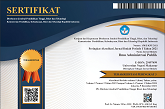Community Participation of Development in Gareccing Village Sinjai Selatan District Sinjai Regency
(1) Universitas Negeri Makassar
(2) Universitas Negeri Makassar
(3) Universitas Negeri Makassar
(*) Corresponding Author
DOI: https://doi.org/10.26858/jiap.v12i2.39445
Abstract
Participation in village development planning meetings is important in the implementation of development in each region, where participation in Gareccing Village is still relatively low so more enthusiasm from community leaders is needed to participate in development meetings. The purpose of this study is to find out Community Participation of Development in Gareccing Village, Sinjai Selatan District, Sinjai Regency. The research method used in this study is a qualitative method with a descriptive approach. The data sources of this study are the Village Chief, Chair and Members of the Village Consultative Body (BPD), Farmers Group, Chair of the Village Community Empowerment Institution (LPMD) and Community Leaders with a total of 8 people. Data collection techniques use interviews and document review. Research results of Community Participation of Development in Gareccing Village, Sinjai Selatan District, Sinjai Regency show that in terms of community participation in village development it can work well with Participation in Decision Making, Participation in Implementation, Participation in Taking Benefits and Participation in Evaluation. Community participation in infrastructure development in Gareccing Village is quite good, because the community provides assistance in the form of energy and thought. This shows that almost all community members know and are active in a series of infrastructure development activities starting from decision making, implementation, utilization, and evaluation of each stage of development undertaken. Participation or participation is basically a form of involvement and active and voluntary participation, the growth of participation in the development process requires trust and opportunities provided by the government to the community to be actively involved in the development process. Through participation, it means truly realizing that development activities are not only obligations that must be carried out by government officials themselves, but also require community involvement. Concern and awareness and responsibility of the community regarding the importance of development which aims to improve their quality of life.
Keywords
Full Text:
PDFReferences
Dergiades, T., Milas, C., & Panagiotidis, T. (2020). Effectiveness of Government Policies in Response to the COVID-19 Outbreak. SSRN Electronic Journal, January. https://doi.org/10.2139/ssrn.3602004
Doh, S., & Kim, B. (2014). Government support for SME innovations in the regional industries: The case of government financial support program in South Korea. Research Policy, 43(9), 1557–1569. https://doi.org/https://doi.org/10.1016/j.respol.2014.05.001
Farida, U., Akib, H., & Jasruddin. (2015). Policy implementation of the national program for community empowerment in rural areas healthy and intelligent generation in Mamuju regency of West Sulawesi, Indonesia. International Journal of Economic Research, 12(5).
Firoiu, D., Ionescu, G. H., Băndoi, A., Florea, N. M., & Jianu, E. (2019). Achieving sustainable development goals (SDG): Implementation of the 2030 Agenda in Romania. Sustainability, 11(7), 2156.
Langkai, J. E., Akib, H., & Sendouw, R. H. E. (2019). The determinants of neighborhood based development policy implementation in Manado city. International Journal of Recent Technology and Engineering, 8(2 Special Issue 9). https://doi.org/10.35940/ijrte.B1047.0982S919
Maulana, R. Y., Bafadhal, F., & Firmansyah, A. (2019). E-Government Implementation: The Concept of Innovative Transformation of Leadership and Public Officials’ Capacities in Indonesian Open Government (The Case of Evaluating E-Government Utilization in Government Information Management in Jambi Province). Available at SSRN 3497307.
Maussumbayev, R., Toleubekova, R., Kaziyev, K., Baibaktina, A., & Bekbauova, A. (2022). Development of research capacity of a future social pedagogue in the face of digital technologies. Education and Information Technologies, 27(5), 6947–6966. https://doi.org/10.1007/s10639-022-10901-3
Miles, M. ., Huberman, A. ., & Saldana, J. (2014). Qualitative Data Analysis, A Methods Sourcebook (Tjetjep Rohindi Rohidi (ed.); 3 ed.). UI-Press.
Nugroho, S., Bandono, A., & Suharyo, O. (2021). Human resources development assessment planning program and bureaucratic reform management on the performance of government organization. Management Science Letters, 11(4), 1429–1438. https://doi.org/10.5267/j.msl.2020.10.020
Onyango, G., & Ondiek, J. O. (2022). Digitalization and Integration of Sustainable Development Goals (SGDs) in Public Organizations in Kenya. Public Organization Review, 21(3), 511–526. https://doi.org/10.1007/s11115-020-00504-2
Rivenbark, W. C., Fasiello, R., & Adamo, S. (2019). Exploring Performance Management in Italian Local Government: The Necessity of Outcome Measures and Citizen Participation. American Review of Public Administration, 49(5), 545–553. https://doi.org/10.1177/0275074018775125
Sucipto, M., Raharjo, T. J., Martono, S., Sugiharto, D. Y. P., & Virgiawan, A. K. (2018). The Implementation of Management Information System of Planning School Infrastructure Development Based on Priority Scale (SIMPPIS) to Improve Students’ Achievement. International Conference on Science and Education and Technology 2018 (ISET 2018).
Wang, Y., Hao, H., & Platt, L. S. (2021). Examining risk and crisis communications of government agencies and stakeholders during early-stages of COVID-19 on Twitter. Computers in Human Behavior, 114, 106568. https://doi.org/https://doi.org/10.1016/j.chb.2020.106568
Yan, Z., Li, W., Tang, X., & Wang, H. (2022). Overseas corporate social responsibility engagement and competitive neutrality of government subsidies: Evidence from multinational enterprises in emerging markets. Journal of International Financial Markets, Institutions and Money, 80, 101625. https://doi.org/https://doi.org/10.1016/j.intfin.2022.101625
Article Metrics
Abstract view : 198 times | PDF view : 41 timesRefbacks
- There are currently no refbacks.
Copyright (c) 2022 Nur Hadriyanti Zainal, Rifdan Rifdan, Sahade Sahade

This work is licensed under a Creative Commons Attribution 4.0 International License.
Diterbitkan oleh:
Program Studi Ilmu Administrasi Publik
Program Pascasarjana Universitas Negeri Makassar
JIAP Index By:

This work is licensed under a Creative Commons Attribution 4.0 International License.









